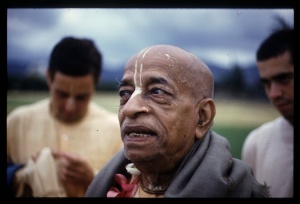CC Adi 4.195: Difference between revisions
m (1 revision(s)) |
No edit summary |
||
| Line 1: | Line 1: | ||
{{ | [[Category:Sri Caitanya-caritamrta - Adi-lila Chapter 04|C195]] | ||
<div style="float:left">'''[[Sri Caitanya-caritamrta|Śrī Caitanya-caritāmṛta]] - [[CC Adi|Ādi-līlā]] - [[CC Adi 4|Chapter 4: The Confidential Reasons for the Appearance of Śrī Caitanya Mahāprabhu]]'''</div> | |||
<div style="float:right">[[File:Go-previous.png|link=CC Adi 4.194|Ādi-līlā 4.194]] '''[[CC Adi 4.194|Ādi-līlā 4.194]] - [[CC Adi 4.196|Ādi-līlā 4.196]]''' [[File:Go-next.png|link=CC Adi 4.196|Ādi-līlā 4.196]]</div> | |||
{{CompareVersions|CC|Adi 4.195|CC 1975|CC 1996}} | |||
{{RandomImage}} | |||
==== TEXT 195 ==== | ==== TEXT 195 ==== | ||
<div | <div class="verse"> | ||
ataeva sei sukha kṛṣṇa-sukha poṣe | :ataeva sei sukha kṛṣṇa-sukha poṣe | ||
ei hetu gopī-preme nāhi kāma-doṣe | :ei hetu gopī-preme nāhi kāma-doṣe | ||
</div> | </div> | ||
| Line 12: | Line 16: | ||
==== SYNONYMS ==== | ==== SYNONYMS ==== | ||
<div | <div class="synonyms"> | ||
''ataeva''—therefore; ''sei''—that; ''sukha''—happiness; ''kṛṣṇa-sukha''—the happiness of Lord Kṛṣṇa; ''poṣe''—nourishes; ''ei''—this; ''hetu''—reason; ''gopī-preme''—in the love of the ''gopīs''; ''nāhi''—there is not; ''kāma-doṣe''—the fault of lust. | |||
</div> | </div> | ||
| Line 19: | Line 23: | ||
==== TRANSLATION ==== | ==== TRANSLATION ==== | ||
<div | <div class="translation"> | ||
Therefore we find that the joy of the gopīs nourishes the joy of Lord Kṛṣṇa. For that reason the fault of lust is not present in their love. | Therefore we find that the joy of the gopīs nourishes the joy of Lord Kṛṣṇa. For that reason the fault of lust is not present in their love. | ||
</div> | </div> | ||
| Line 26: | Line 30: | ||
==== PURPORT ==== | ==== PURPORT ==== | ||
<div | <div class="purport"> | ||
By looking at the beautiful gopīs Kṛṣṇa becomes enlivened, and this enlivens the gopīs, whose youthful faces and bodies blossom. This competition of increasing beauty between the gopīs and Kṛṣṇa, which is without limitations, is so delicate that sometimes mundane moralists mistake these dealings to be purely amorous. But these affairs are not at all mundane, because the gopīs’ intense desire to satisfy Kṛṣṇa surcharges the entire scene with pure love of Godhead, with not a spot of sexual indulgence. | By looking at the beautiful ''gopīs'', Kṛṣṇa becomes enlivened, and this enlivens the ''gopīs'', whose youthful faces and bodies blossom. This competition of increasing beauty between the ''gopīs'' and Kṛṣṇa, which is without limitations, is so delicate that sometimes mundane moralists mistake these dealings to be purely amorous. But these affairs are not at all mundane, because the ''gopīs’'' intense desire to satisfy Kṛṣṇa surcharges the entire scene with pure love of Godhead, with not a spot of sexual indulgence. | ||
</div> | </div> | ||
__NOTOC__ | |||
<div style="float:right; clear:both;">[[File:Go-previous.png|link=CC Adi 4.194|Ādi-līlā 4.194]] '''[[CC Adi 4.194|Ādi-līlā 4.194]] - [[CC Adi 4.196|Ādi-līlā 4.196]]''' [[File:Go-next.png|link=CC Adi 4.196|Ādi-līlā 4.196]]</div> | |||
__NOTOC__ | |||
__NOEDITSECTION__ | |||
Revision as of 06:42, 7 September 2021

A.C. Bhaktivedanta Swami Prabhupada
TEXT 195
- ataeva sei sukha kṛṣṇa-sukha poṣe
- ei hetu gopī-preme nāhi kāma-doṣe
SYNONYMS
ataeva—therefore; sei—that; sukha—happiness; kṛṣṇa-sukha—the happiness of Lord Kṛṣṇa; poṣe—nourishes; ei—this; hetu—reason; gopī-preme—in the love of the gopīs; nāhi—there is not; kāma-doṣe—the fault of lust.
TRANSLATION
Therefore we find that the joy of the gopīs nourishes the joy of Lord Kṛṣṇa. For that reason the fault of lust is not present in their love.
PURPORT
By looking at the beautiful gopīs, Kṛṣṇa becomes enlivened, and this enlivens the gopīs, whose youthful faces and bodies blossom. This competition of increasing beauty between the gopīs and Kṛṣṇa, which is without limitations, is so delicate that sometimes mundane moralists mistake these dealings to be purely amorous. But these affairs are not at all mundane, because the gopīs’ intense desire to satisfy Kṛṣṇa surcharges the entire scene with pure love of Godhead, with not a spot of sexual indulgence.